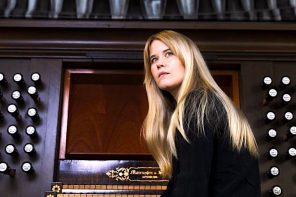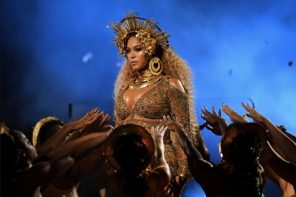And it came to pass after the captivity of Israel and the desolation of Jerusalem that Jeremiah sat mourning and he lamented this lament.
Kendrick Lamar’s Untitled Unmastered (UU), surprise-released at the beginning of this month, paints an intimate portrait of the artist’s emotional, psychological and religious pro/digression.
And for me it hits close to home.
Kendrick’s lyrics reflect existential questions authors like Kelly Brown Douglas and I have been wrestling with post-Trayvon. Also, I live on the Westside of Chicago where my neighbors are well acquainted with the visceral reality Kendrick’s lyrics speak to.
I suppose what follows is a review. But more specifically I am going to be interacting with Kendrick’s UU as a prophetic text of lamentation—it is a text which, like all texts of lament, reveals something about the author as well as society. If To Pimp a Butterfly (TPAB) is where Kendrick accepts his prophetic vocation and divulges a fiery word, then UU is Kendrick’s Jeremiad.
(It should be noted that if the title tracks of UU are representative of when he recorded them then it would seem that Kendrick was wrestling with his prophetic vocation even when he was recording TPAB. I don’t think it’s an accident though that tracks from UU didn’t make it on TPAB. Usually a prophecy comes before a lament—e.g. first the Book of Jeremiah then the Book of Lamentations.)
What I want to do here is suss out a comparison between the life, times, and texts of the prophet Jeremiah and Kendrick Lamar. Jeremiah was a prophet tasked with guiding the people through the loss of Jerusalem in 586 BCE. Kendrick is navigating us through the loss of black life in a “post-racial” America. Both poets’ writings also reveal a deep conflictedness not only with their own inner life but with the realpolitik of their day.
With apocalyptic lyrics and a tone that can only be described as a funky-dirge, Kendrick sets the mood,
No birds chirping or flying, no dogs barking
We all nervous and crying, moving in caution
In disbeliefs our beliefs the reason for all this
The tallest building plummet, cracking and crumbling
The ground is shaking, swallowing young woman
With a baby, daisies, and other flowers burning in destruction
Now compare Kendrick’s salvo to Jeremiah’s lament for Jerusalem:
My eyes are spent with weeping;
my stomach churns;
…
because of the destruction of my people,
because infants and babes faint
in the streets of the city.
They cry to their mothers,
“Where is bread and wine?”
as they faint like the wounded
in the streets of the city,
as their life is poured out
on their mothers’ bosom.
What can I say for you…
O daughter Jerusalem? (Lam. 2:11-13)
Jeremiah’s gendering of Jerusalem as feminine is echoed by Kendrick’s narration of the black feminine in Untitled 08—“Why so Sad? She said I’m down on my luck / …and it’s breaking me down honey.” (Soong-Chan Rah’s Prophetic Lament contends with the problematic aspects of Jeremiah’s construction of Jerusalem as female. And regarding Kendrick’s own tendency to sexism and stereotype in his lyrics, Arielle Newton and Raquel Willis offer critiques that are indispensable and prophetic in their own right.)
The injustice of “genocism and capitalism” that continues to enforce what theologian Walter Brueggemann calls a “top-down coercive order” against blacks has caused Kendrick to have a breakdown of his own. Like Kendrick, Jeremiah expresses indignation over unchecked evil:
When all the prisoners of the land
are crushed under foot,
when human rights are perverted
in the presence of the Most High,
when one’s case is subverted
—does the Lord not see it? (Lam. 3:34-36)
Why does the way of the guilty proposer?
Why do all who are treacherous thrive?
…
Their course has been evil,
and their might is not right. (Jer. 12:1b & 23:10b)
The all-encompassing, oppressive ideology of Jeremiah’s day was lauded by the urban elite, the religious, the imperial superpowers and local politicians who created hell on earth for the poor. Jeremiah’s cry can be summed up in Kendrick’s lyric, “Some of us never did wrong but still went to hell.” For Kendrick, hell is America’s creation of the ghettos, its prison industrial complex, its clandestine torture dungeons in poor neighborhoods.
This is hell. This is the literal hell.
And glimpsing this hell drives both our prophets into the abyss. Both are traumatized at the godforsakenness of their personal situations— a microcosm of their society’s ills. Kendrick says:
I made To Pimp a Butterfly ‘for you / told me
To use my vocals to save man-kind for you
Say I didn’t try for you, say I didn’t ride for you
I tithed for you, I pushed the club to the side for you
Who love you like I love you?
In this terse, existential section Kendrick exhibits a sort of incredulity towards God. Again, compare Jeremiah’s “dirty-talk” addressed to God,
Your words were found, and I ate them,
and your words became to me a joy
…
I did not sit in the company of merrymakers,
nor did I rejoice;
under the weight of your hand I sat alone,
for you had filled me with indignation.
Why is my pain unceasing,
my wound incurable,
refusing to be healed?
Truly, you are to me like a deceitful brook,
like waters that fail. (Jer. 15:16a-18)
The language in this section is bold and daring. This makes sense because, as Soong-Chan Rah succinctly puts it, “lament is the language of suffering.” Kendrick wants to “get God on the phone” but, just as in the Book of Lamentations, God remains silent.
But that doesn’t stop Kendrick from baring his soul,
Why you wanna see a good man with a broken heart?
Once upon a time I used to go to church and talk to God
Now I’m thinkin’ to myself, hollow tips is all I got
There’s nothing quite as audacious as calling God a liar or suggesting that communing with this God leaves one with “hollow tips.” But these poets know no bounds. Not only do they scandalize us with their sacrilegious talk but they also have the gall to presume their enemies will get what’s coming to them,
Let my persecutors be shamed,
…
bring on them the day of disaster;
destroy them with double destruction! (Jer. 17:18)
…
Therefore give their children over to famine;
hurl them out to the power of the sword,
let their wives become childless and widowed.
May their men meet death by pestilence,
their youths be slain by the sword in battle.
May a cry be heard from their houses… (Jer. 18:21-22a)
Kendrick, like Jeremiah, fantasizes about retaliation and revenge,
Somebody said you bumped your head and bled the floor
Jumped into a pit of flames and burned to coal
Drowned inside the lake outside away you flow
And that means the world to me
Watch you when you walk inside your house
You threw your briefcase all on the couch
I plan on creeping through your fuckin’ door and blowin’ out
Every piece of your brain until…
Dispassionate prayer won’t do, a sermon from the preacher-man won’t do, another worship chorus won’t do! Only the most base and primal words can be uttered here. But neither one can finally act out their fantasies of violence. Surely this is because by airing their dirty laundry the poets have given these violent laments over to God.
In the end, fantasy is all they have to show for their tough talk. The narrative of Jeremiah 18 ends abruptly without any hint of that “double destruction.” As for Kendrick, the “until” of his verse tells us everything we need to know,
…until your son jump into your arms
Cut on the engine, then sped off in the rain
I’m gone.
Truly, as Brueggemann tells it, “the vocation of a prophet is [a] conflicted way to live.” We get some sense of this conflictedness when, despite his and his communities’ inconsolable reality of loss, Jeremiah imagines a real political Messiah who will rescue his people from imperial totalism (Jer. 23:5-6). This is the Messiah who, as womanist theologian Jacquelyn Grant expresses it, will liberate the oppressed from unjust “sociopsychological, psychocultural, economic and political” powers.
Until then Kendrick—channeling Jeremiah—weeps and writes because he has to: “Two tears in the bucket I cry with you / I write ‘till I’m right with God” (Lam. 3:48 & Jer. 20:9).
That UU was released during the Lenten season is no coincidence. Typically this is a time for American Christians to saturate themselves in a premature Easter triumphalism; thus the abyss is never broached. Many religious people in general and Christian people in particular will not be able to dwell in the sustained, unresolved lament of Untitled Unmastered.
So the prophets do it for them.
And it came to pass after the slavery of America and its plundering of dark bodies that Kendrick sat mourning and he lamented this lament.





